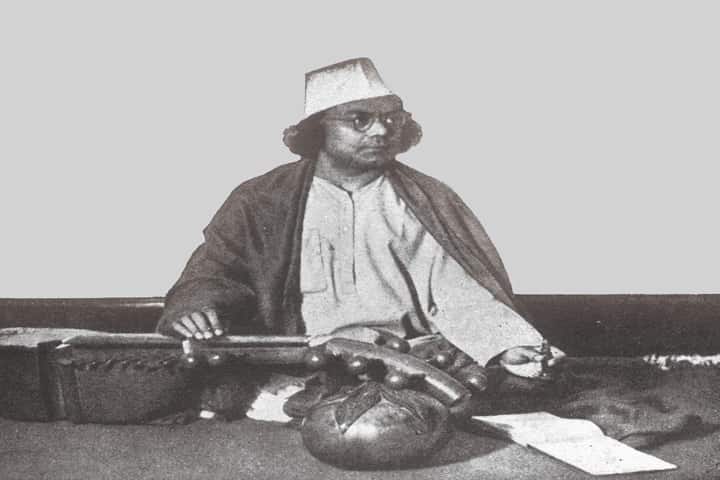

As a true symbol of syncretic culture of the subcontinent, Kazi Nazrul Islam exhorted people from all faiths to come together and embrace each other (Pic. Courtesy wikimedia commons)
He was not just a master of letters or a man who could weave magic through words in the form of verse and prose. A multi-faceted personality Kazi Nazrul Islam born on May 24, 1899, was more than a literary figure who inspired hundreds of thousand young men and women to fight against the British.
Interestingly, his powerful writing continued to motivate people, including the Bangladeshis during their struggle against the domination and atrocities by West Pakistan establishment after Partition in 1947 in the eastern part of the newly-carved nation.
Born in Churulia village in Asansol which is now in West Bengal, Islam had a tough childhood following his father’s death when he was merely 10. He did all sorts of jobs to support his family. Joining his uncle Fazle Khan’s travelling theatrical group, he learnt to write songs and poems as well as act. He also studied Bengali literature and reflecting his syncretic views, also pursued Sanskrit literature and Hindu scriptures, including Puranas. He was already well-versed in the Quran, Hadith and Islamic philosophy and theology.
Leaving school early, he joined the British Indian Army in 1917 to leave in 1920 and during this phase he read Rabindranath Tagore, Sarat Chandra Chatterjee, and Persian poets like Hafiz, Rumi and Omar Khayyam – all of whom left an indelible mark on him.
In 1919 he wrote his first prose “Life of a Vagabond” and published his first novel in 1920 called “Freedom from Bondage”.
Exhibiting his free spirit in 1921, he refused to get married to a woman named Nargis when it was insisted that he should reside in Daulatpur, Comilla from where she hailed. The same year, Islam broke the prevailing shackles of the society by falling in love with a Bengali Hindu woman, named Pramila Devi, receiving flak from both the communities.
While enriching the Islamic literature by writing Bengali ghazals and Islamic songs he also wrote bhajans, kirtans and devotional songs. Born as an orthodox Sunni Muslim, Islam called upon people from all denominations to come forward and embrace each other forsaking narrow mindedness, factionalism and fanaticism.
Championing the cause of women, Islam in his poem “Naari” talked about the confluence of the roles of both sexes and their equal importance while in his poem “Barangana” (Prostitute), he referred to the sex workers as mother stunning the society. In this revolutionary poem he took society to task for its negative views about prostitutes, whom he first viewed as human beings.
At a time when the majority of the people, including those in the creative field, were impressed by Western culture and sensibilities, Islam wrote more than 600 songs based on Indian classical ragas; more than 100 based on Indian folk tunes and many patriotic songs. He was vastly inspired to write songs based on Baul sangeet, Santhali folksongs, and jhanpan, or the folk songs of snake charmers, and bhatiali sangeet.
Though going back to his roots for his creativity, Islam never shied away from what the modern times offered. He proved to be a great success both in theatre and film industry. He directed “Dhruva Bhakta” to become the first Muslim director of a Bengali film and gave music for the film based on Tagore’s novel “Gora”. He wrote songs and directed music for Sachin Sengupta’s biographical epic play based on the life of Siraj-ud-Daula.
Working for Calcutta Radio he supervised the production and broadcasting of several musical programmes.
Even after his death, his single greatest achievement is that he is a binding force and factor that unites the literary as well as common people of Bangladesh and West Bengal as they all look upon him as a legacy which they are proud of. He is indeed the symbol of Bengali nationalism along with Gurudev Rabindranath Tagore.
Sub Lieutenant Astha Poonia officially became the first woman to be streamed into the fighter…
As Israel awaits Hamas's response on Friday to the latest proposal for a hostage release…
Deputy Chief of Army Staff (Capability Development and Sustenance), Lieutenant General Rahul R Singh, on…
A report on Bangladesh's media landscape has revealed that the restrictive laws and political press…
Prime Minister Narendra Modi has said that India is actively working on creating a comprehensive…
The Indian Chamber of Commerce (ICC) on Thursday hosted the 14th India Minerals and Metals…